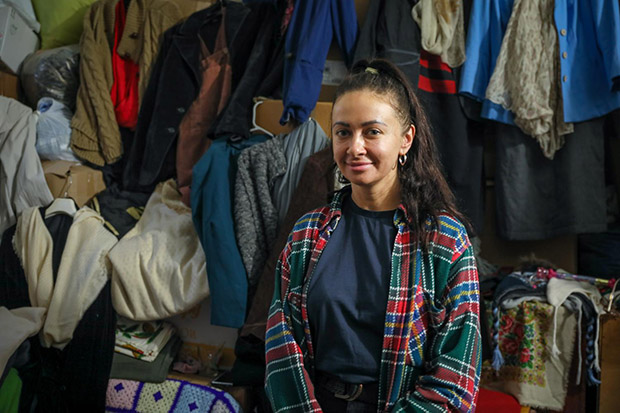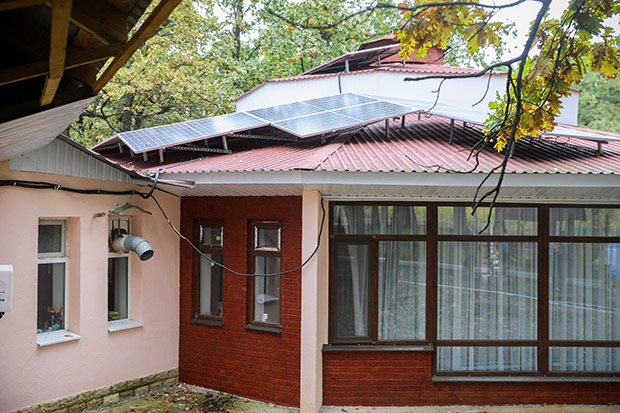
Natalia, who fled Ukraine with her son earlier this year, is a volunteer at the supply and resource hub in Balti. Here, she is standing with winter clothes that will be distributed to Ukrainian refugees and their Moldovan hosts. Read her story in the link at the bottom of this article.
Temperatures are dropping in the European nation of Moldova. Each night is a little longer than the one before it, and the first snowflakes of winter will be here soon. Sadly, most indicators show that it will likely be a long, hard winter in Moldova this year.
Energy dependence and poverty have long taken a toll here. The International Energy Agency says that, “Moldova’s energy self-sufficiency is very low, among the lowest in the world.” Moldova relies on importing its natural gas, oil and coal from neighboring countries. It is heavily dependent on fuel imports from Russia, and concern is brewing that Moldova may not have enough natural gas to get through the winter.
At a time when many of us are feeling the squeeze of rising inflation, Moldova is facing inflation that is among the highest in the world. Everything is rapidly getting more and more expensive, and that includes fuel and electricity. The Washington Post reported in late October that “energy bills now amount to more than 60% of an average Moldovan’s living costs, officials in Chisinau said.”
Finally, Russia’s invasion of Ukraine has had a massive impact in Moldova. Moldova lies directly on Ukraine’s western border. Despite being one of the poorest nations in Europe, and not being a member of the European Union or NATO, Moldova has opened its arms to welcome Ukrainian refugees. In fact, Moldova has welcomed the highest number of Ukrainian refugees of any of Ukraine’s neighbors relative to population size.
In recent days, the Russian military has leaned on a specific tactic in its unprovoked aggression against Ukraine: attacking its electricity infrastructure. Its objective is to cripple Ukraine’s power grid, deepening the war’s humanitarian cost. The timing is no coincidence: winter is nearly here. Many Ukrainians who can get by with limited electricity in the spring and summer will be forced to leave their homes as temperatures plummet and it becomes unbearably cold.
The impact of the attacks is already being felt. Nearly a third of Ukrainian power stations have been destroyed in recent days. Ukraine has had to implement rolling blackouts, and its government has asked refugees abroad not to return home until spring so as not to further strain the damaged power grid. Moldova, which relies on Ukraine for some of its electricity, is also facing electricity shortages as a direct result of the ongoing attacks.
Tens of thousands more Ukrainians will likely flee to Moldova this winter. In fact, the UNHCR is anticipating that an additional 40,000 Ukrainians will enter Moldova in the coming months; a recent uptick in refugee arrivals is an early indication of this. Adding this many refugees during the coldest months could add massive strain to systems that are already being pushed to their breaking points.
All of this means that we’re in a race against the clock to prepare Ukrainian refugees and the Moldovan communities who have so warmly welcomed them for winter. For months now, CWS has supported a supply and service hub in the town of Balti. Refugees can pick up food and hygiene supplies, get medical or mental health support, and connect to other available services. We have added warm clothes to our inventory so that our clients can equip themselves as temperatures drop, and other organizations have donated blankets that volunteers at the hub are distributing as well. All of the supplies that we distribute are purchased locally, which also means funds that local business owners can use to support their families through the coming winter.

The photovoltaic system on the Refugee Accommodation Center in Soroca, installed by Ormax with CWS funding. Learn more at the link at the bottom of this article.
We are also investing in renewable energy infrastructure to support long-term energy independence in Moldova. CWS has worked with our local partner, Ormax, for years to build and install photovoltaic systems. We’ve brought our expertise and resources to two Refugee Accommodation Centers, or RACs, which are official government shelters for Ukrainian refugees. We’ve added a photovoltaic system to a RAC in the Soroca District. That RAC is usually a summer camp for Moldovan children, so when it returns to its original purpose, that system will be there for the community to use for decades. We are currently in the midst of a second installation. This one is a photovoltaic system and energy efficient heat pump on a community center that is currently a RAC. Both systems will help their respective sites keep expenses low this winter and ensure a more consistent and sustainable source of power.
There is local demand for more photovoltaic systems, so this work will continue after the current installation is finished. We’re also coordinating with local authorities and partners to consider other ways to help Ukrainains and Moldovans alike get firewood and pay utility bills in the coming winter.
The arrival of winter is inevitable. But poverty, blackouts and suffering don’t have to be. If you’d like to support our programs in Moldova, donate to our Ukraine Crisis Response Fund.
Stories connected to the photos in this article: A Safe Home & a Warm Hug (Natalia’s Story) | “A Strong Remedy for Climate Change” (Photovoltaic Systems)
